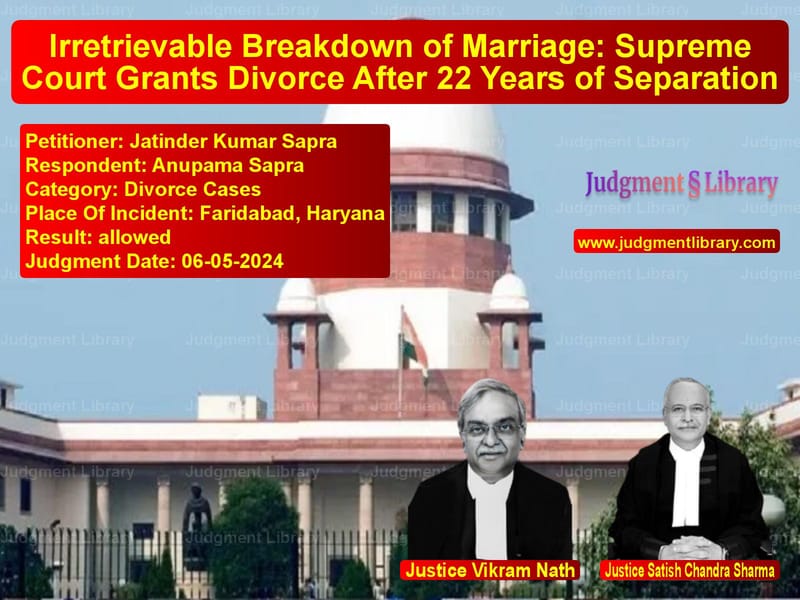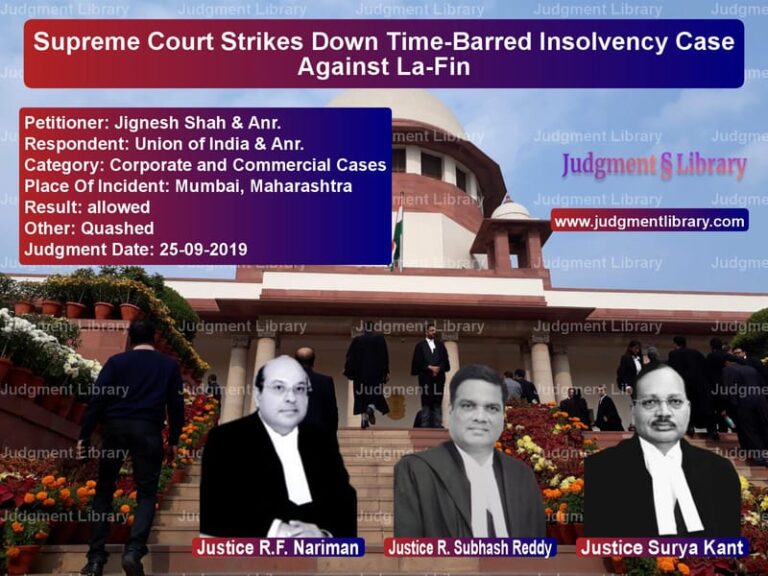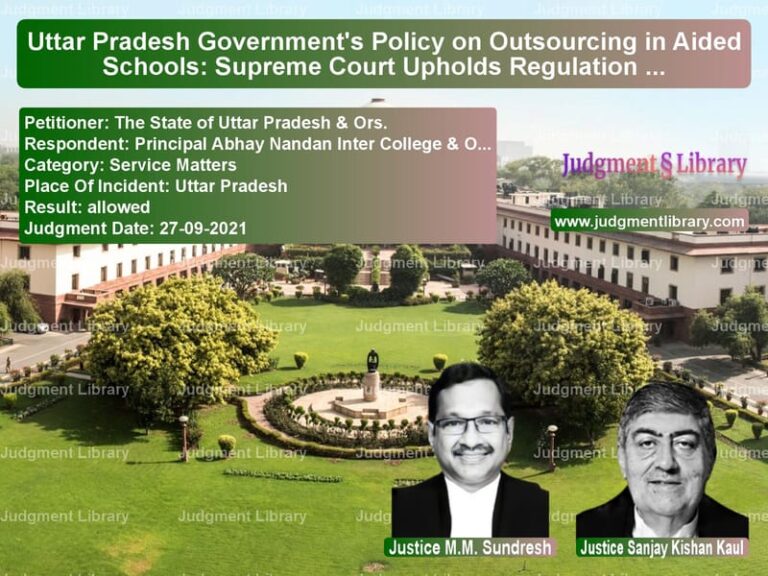Irretrievable Breakdown of Marriage: Supreme Court Grants Divorce After 22 Years of Separation
The case of Jatinder Kumar Sapra vs. Anupama Sapra is a significant judgment where the Supreme Court invoked its extraordinary powers under Article 142(1) of the Constitution of India to grant a divorce on the grounds of irretrievable breakdown of marriage. The judgment, delivered on May 6, 2024, reflects the Court’s commitment to ensuring ‘complete justice’ by considering the prolonged separation of the parties and the impossibility of reconciliation.
Background of the Case
The appellant, Jatinder Kumar Sapra, and the respondent, Anupama Sapra, were married on October 14, 1991, as per Hindu rites and customs in Faridabad, Haryana. The couple had two children, born in 1993 and 1996. However, after living together for approximately 14 years, disputes arose between them, leading to complete estrangement.
Both parties accused each other of cruelty. The husband claimed that the wife had ill-treated him and acted against him under the influence of her parents, while the wife alleged harassment and cruelty at the hands of the husband.
The appellant filed for divorce under Section 13(1)(ia) of the Hindu Marriage Act, 1955, citing cruelty. However, the Family Court, Faridabad, dismissed his petition on December 9, 2004. Aggrieved, he approached the Punjab and Haryana High Court, which upheld the Family Court’s decision on July 26, 2019. Subsequently, the appellant filed a special leave petition (SLP) before the Supreme Court.
Arguments by the Petitioner
The petitioner, through his counsel, contended:
- The couple had been living separately for 22 years since January 2002.
- There was no chance of reconciliation between them.
- The Supreme Court should exercise its powers under Article 142(1) to grant a divorce based on irretrievable breakdown of marriage.
- Relying on the precedent in Shilpa Sailesh v. Varun Sreenivasan, 2023 SCC Online SC 544, he argued that prolonged separation and lack of cohabitation justified dissolution of marriage.
Arguments by the Respondent
The respondent-wife opposed the divorce petition, asserting:
- The allegations of cruelty were false and unsubstantiated.
- She had faced difficulties due to the separation and was financially dependent.
- Granting divorce without adequate financial security would be unjust.
Supreme Court’s Observations
The Supreme Court extensively referred to its ruling in Shilpa Sailesh v. Varun Sreenivasan, which laid down guidelines for granting divorce under Article 142(1). The Court noted:
“That the marriage has irretrievably broken down is to be factually determined and firmly established. For this, several factors are to be considered such as the period of time the parties had cohabited after marriage, when they last cohabited, the nature of allegations made, the period of separation, and attempts at mediation.”
The Court found that:
- The couple had been separated for 22 years with no possibility of reconciliation.
- The children were now adults and financially independent.
- There was no purpose in continuing the legal marital bond when the relationship had broken down beyond repair.
Judgment and Key Directions
The Supreme Court allowed the appeal and granted a decree of divorce, stating:
“The undisputed facts of the case reveal that the parties have separated 22 years ago, having last cohabited in January 2002. We are satisfied that the marriage is emotionally dead and beyond salvation. Accordingly, the formal union between the parties is neither justified nor desirable.”
The Court also considered the wife’s financial position and ordered the husband to pay ₹50,00,000 (Fifty Lakh Rupees) as permanent alimony. The amount was directed to be paid in five installments:
| Date | Amount (INR) |
|---|---|
| May 15, 2024 | ₹10,00,000 |
| June 15, 2024 | ₹10,00,000 |
| July 15, 2024 | ₹10,00,000 |
| August 15, 2024 | ₹10,00,000 |
| September 15, 2024 | ₹10,00,000 |
The divorce decree was to be issued only upon proof of full payment.
Impact of the Judgment
This ruling is significant as it reinforces the Supreme Court’s evolving approach towards irretrievable breakdown of marriage. The key takeaways are:
- The Court can exercise its power under Article 142(1) to dissolve marriages that are beyond repair.
- Separation of over six years is a crucial factor in determining irretrievable breakdown.
- Financial security for the dependent spouse is a priority in divorce cases.
- The Court ensures that a divorce decree is conditional upon compliance with financial obligations.
Conclusion
The case of Jatinder Kumar Sapra vs. Anupama Sapra is a landmark ruling that underscores the judiciary’s ability to provide complete justice in matrimonial disputes. By recognizing the irretrievable breakdown of marriage and ensuring financial support for the wife, the Supreme Court has set a precedent for similar cases where prolonged separation makes reconciliation impossible.
The ruling reaffirms the notion that a failed marriage should not bind individuals indefinitely when there is no chance of revival, thereby upholding personal freedom and dignity within the legal framework of India’s marriage laws.
Petitioner Name: Jatinder Kumar Sapra.Respondent Name: Anupama Sapra.Judgment By: Justice Vikram Nath, Justice Satish Chandra Sharma.Place Of Incident: Faridabad, Haryana.Judgment Date: 06-05-2024.
Don’t miss out on the full details! Download the complete judgment in PDF format below and gain valuable insights instantly!
Download Judgment: jatinder-kumar-sapra-vs-anupama-sapra-supreme-court-of-india-judgment-dated-06-05-2024.pdf
Directly Download Judgment: Directly download this Judgment
See all petitions in Alimony and Maintenance
See all petitions in Mutual Consent Divorce
See all petitions in Property Division in Divorce Cases
See all petitions in Judgment by Vikram Nath
See all petitions in Judgment by Satish Chandra Sharma
See all petitions in allowed
See all petitions in supreme court of India judgments May 2024
See all petitions in 2024 judgments
See all posts in Divorce Cases Category
See all allowed petitions in Divorce Cases Category
See all Dismissed petitions in Divorce Cases Category
See all partially allowed petitions in Divorce Cases Category







